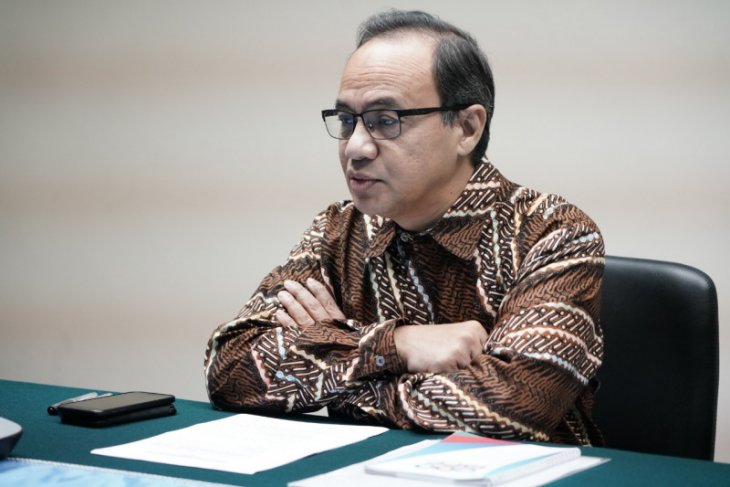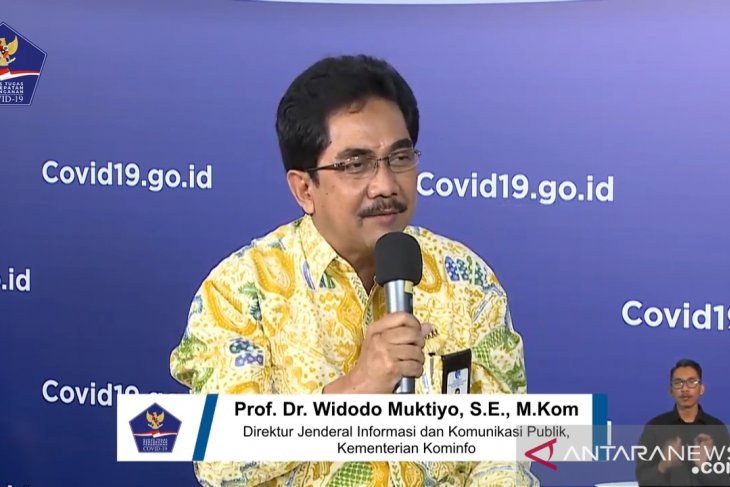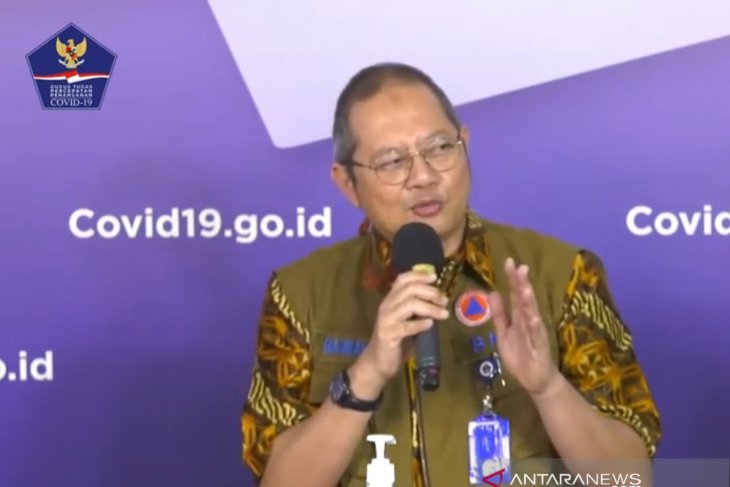Live Streaming
Program Highlight
Company Profile
May
Wisma Atlet Hospital Offers Inpatient Treatment to 172 Returnees
Written by Ani Hasanah
Head of the Wisma Atlet Hospital Vice Admiral Yudo Margono, concurrently commander of the Joint Regional Defense Command I. (ANTARA FOTO)
A total of 172 Indonesians are receiving inpatient treatment at the Wisma Atlet Emergency Hospital (RSD) in Kemayoran, Central Jakarta, on Thursday, shortly after returning from abroad.
The Indonesians comprised ship crew members as well as jemaah tabligh members and students, head of the Wisma Atlet Hospital Vice Admiral Yudo Margono, concurrently commander of the Joint Regional Defense Command I, noted in a statement in Jakarta on Thursday.
They were among the 1,806 Indonesians, who had just arrived from abroad. Of the total, 1,006 people were allowed to return home, while 628 others were still awaiting the result of swab test, he revealed.
The 628 Indonesians were self-isolating at several locations, including the Pondok Gede hajj dormitory, Bambu Apus social shelter, and hotels whilst awaiting the result of swab test, he confirmed.
In the wake of the COVID-19 pandemic, President Joko Widodo (Jokowi) has instructed relevant ministries to take precautionary measures for the return of 34 thousand Indonesian migrant workers, whose work contract will end in May and June.
"Precautionary measures must be taken against this, and adequate preparations must be made. We should handle their arrivals through certain entry gates and monitor their movements to their hometowns," Jokowi stated during a videoconference on the acceleration of COVID-19 handling at the Merdeka Palace here on Monday.
The Kemayoran Athlete's Village was converted to officially serve as a COVID-19 Emergency Hospital on March 23, 2020. The hospital has the capacity to accommodate 12 thousand patients.
May
Malaysia Likely to Repatriate 421 Undocumented Indonesian Workers
Written by Ani Hasanah
Indonesian Foreign Ministry's spokesperson, Teuku Faizasyah. (Handout Kemlu RI)
Malaysian authorities arrested 421 undocumented Indonesian workers during raids in several areas across the country this month and are expected to repatriate them to Indonesia once the legal process is completed, the Foreign Ministry said.
Malaysian authorities apprehended the workers for allegedly violating the country's immigration regulations, such as residing in the country without valid documents, over-staying, and possessing fake documents, Indonesian Foreign Ministry spokesperson Teuku Faizasyah told journalists in Jakarta on Wednesday.
The workers are currently being detained at the Malaysian Immigration's detention house, and the Indonesian Embassy in Kuala Lumpur has provided them with consular facilities, Faizasyah informed.
"Based on our experience, the Indonesians arrested and then detained by Malaysian Immigration (authorities) will be repatriated to Indonesia after they have completed the country's legal process," he added.
The 421 undocumented Indonesian citizens were arrested during raids in Pasar Borong Selayang, Kuala Lumpur, on May 11, 2020.
Besides the Indonesians, the Malaysian Immigration authorities have also detained 790 Myanmar citizens, 54 Indians, six Pakistanis, 78 Bangladeshis, and several other foreigners.
The Malaysian Health Ministry has declared that 7,551 foreign nationals that the country's authorities have questioned and 1,368 undocumented foreigners currently detained in the country have tested negative for the new coronavirus disease.
In view of the impact of Malaysia's movement control order (MCO) on Indonesian migrant workers, the Indonesian Government has announced aid for severely affected workers.
The government is obliged to assist all Indonesians who have been severely affected by the neighboring country's MCO policy, irrespective of their status, the Indonesian Foreign Ministry's director for the Protection of Citizens and Legal Entities Overseas, Judha Nugraha, said.
The Malaysian Government is planning to extend the enforcement of its movement order control until June 9, 2020 to slow the spread of the deadly coronavirus disease. The MCO was first imposed on March 18 this year.
Since the month of April, 348,843 recipients have been provided relief under the Indonesian government's aid program for migrant workers in Malaysia.
Coronavirus infections initially emerged in the Chinese city of Wuhan at the end of 2019. Since then, COVID-19 has spread to at least 202 countries and territories, including Malaysia and Indonesia, with a massive spurt in the death toll.
The Indonesian Government officially confirmed the country's first cases on March 2 this year. (ANTARA)
May
Ministry of Communication and Informatics Records 686 Hoaxes on COVID-19
Written by Ani Hasanah
Director General of Public Information and Communication at the Ministry of Communication and Informatics, Widodo Muktiyo. (ANTARA/Ahmad Zulfikar)
The Indonesian Ministry of Communication and Informatics has, as of Wednesday, recorded 686 false news stories, or hoaxes, in regard to COVID-19, which have disrupted the dissemination of information on the pandemic, said an official.
"There are individuals who deliberately create different information and create noise. This is a challenge for public information as well," said director general of Public Information and Communication at the Ministry of Communication and Informatics, Widodo Muktiyo, at an online discussion forum on the Task Force for the Acceleration of COVID-19 Handling completing two months, held on Wednesday in Jakarta.
He said individuals can easily produce and distribute their own information at any moment, without requiring any permits, while the Ministry of Communication and Informatics can only enforce rules and sanctions based on the regulations stipulated in the Information and Electronic Transactions Law (ITE).
"If the rules are violated, then there are sanctions. There have been 103 (individuals) who have faced criminal and legal issues to date," he informed.
With regard to hoaxes, he explained, there are three platforms on which such “noises” in information occur, the first one being the Internet.
When problems occur at this first level, a relevant ministry can communicate them to the internet service provider, he said.
The Ministry of Communication and Informatics can take direct action when false information circulates on the second platform — social media, including Instagram, Facebook, and Twitter.
When violations occur on these platforms, the Ministry or the relevant authorities can take the posts down or block them to prevent other users from seeing or accessing false information.
"The most dangerous level is the third level: closed media systems, such as WhatsApp groups," Muktiyo informed.
Despite the closed media system being more challenging to tackle than the others, he said he believed that all three platforms present their own challenges in ensuring that the public does not blindly consume false information and take it as the truth, especially considering the impact of COVID-19, which has created economic and social issues, as well as social assistance related matters.
He said fake news could add to wrong perceptions established among the public, and thus, hurt the nation and the people. (ANTARA)
May
Data Collection Paramount to Promptly Handling COVID-19 : Task Force
Written by Ani Hasanah
Chief of the BNPB Operation Control Center Bambang Surya Putra
Chief of the National Disaster Mitigation Agency (BNPB)'s Operation Control Center Bambang Surya Putra attached importance to data collection to fulfill the on-field needs quickly and accurately to facilitate prompt and efficient handling of the COVID-19 outbreak.
"This is because we are competing with the swiftly spreading COVID-19 pandemic. This COVID-19 is spreading faster than the speed we can handle," he stated during a press conference at the National Disaster Mitigation Agency (BNPB), Jakarta, on Wednesday.
Putra highlighted the need for collecting on-field data and information on the number of people that contracted COVID-19 to meet their needs and supplies suitably.
"This is since anything pertaining to information and data will influence the decision and will affect a COVID-19 disaster management operation," he expounded.
At the onset of the COVID-19 disaster in Indonesia, he acknowledged that the Regional Government (Pemda) mostly conducted the COVID-19 operational control. However, the regional government and task force are not necessarily ready with swift data communication.
"At that time, everyone was in a state of real shock. At that time, everyone was focused on handling," he stated.
Putra believes that handling can be done quickly, though data is also expected to be received swiftly so that the response team can make a precise calculation of the needs.
"Hence, we are optimistic of swift data collection, so we know which hospitals need more protective equipment and also reagents or other requirements," he stated.
"Hence, when we are slow, the handling will certainly be affected," he further remarked.
The coronavirus disease, which initially struck the Chinese city of Wuhan at the end of 2019, has since then spread to at least 202 countries and territories, including Indonesia, with a massive increase in the death toll.
The Indonesian government officially announced the country's first confirmed cases on March 2 this year. The ongoing COVID-19 pandemic has weakened the purchasing power of scores of Indonesian families, particularly those, who have lost their jobs.
Meanwhile, President Jokowi has highlighted the importance of fostering the spirit of "gotong royong", or mutual cooperation, in responding to the impact of the COVID-19 pandemic, arguing that the government cannot work single-handedly to combat the transmission of coronavirus infections.
The central and regional governments nationwide have also been striving persistently to flatten the coronavirus curve by imposing healthcare protocols and social restrictions.
To break the chain of transmission, large-scale social restrictions have been applied in several other cities, including Jakarta, Bogor, Depok, Tangerang, and Bekasi.
The central government has also banned homebound travel, locally known as “mudik,” during the fasting month of Ramadhan and the Idul Fitri holiday season. (ANTARA)


